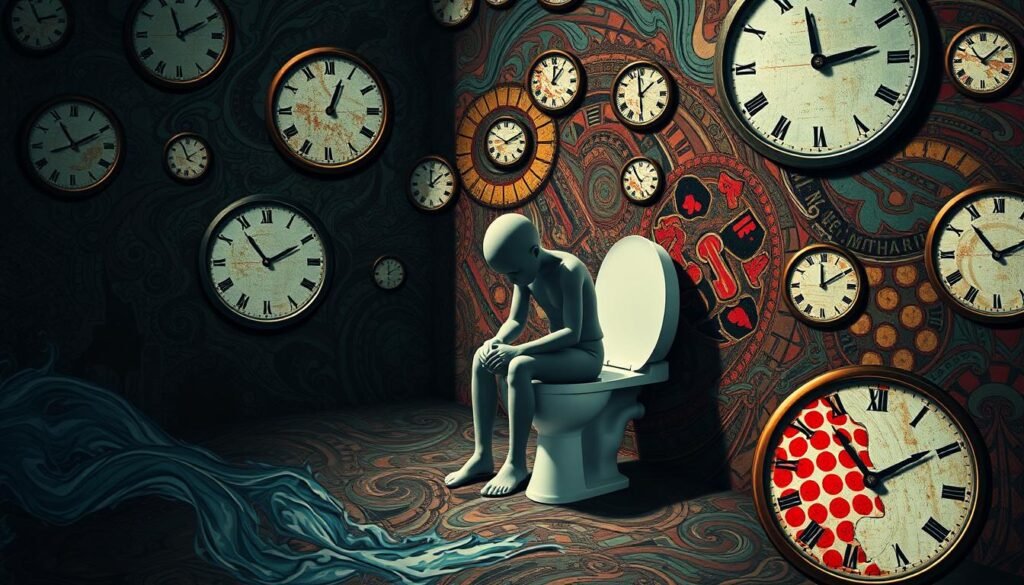Almost half of those with overactive bladder also struggle with anxiety. This fact reveals a deep link between mental stress and the need to urinate often. Many overlook the impact anxiety has on this issue, seeing it just as a physical problem.
It’s important to recognize how anxiety affects our bladder and increases bathroom visits. This knowledge is key for taking care of our health. This article will explore why we may need to pee more when anxious and offer tips to manage it better.
Key Takeaways
- Frequent urination can be a symptom of both physical and psychological issues.
- Anxiety may trigger an overactive bladder, leading to multiple trips to the restroom.
- 48% of people with overactive bladder report experiencing anxiety symptoms.
- Changes in lifestyle and behavior can significantly help manage anxiety-induced urinary frequency.
- Recognizing the signs of anxiety is crucial for addressing frequent urination issues.
- Professional help and therapy options are available for those struggling with anxiety and bladder problems.
Understanding Frequent Urination
Frequent urination means needing to pee more often than usual. It can come with a strong urge to go quickly, known as urgent urination. Knowing about frequent urination is key to finding out why it happens.
What is Frequent Urination?
If you urinate over seven times a day after drinking about two liters of fluids, that’s frequent. It can mess with your day and stress you out. Normally, people go about six to seven times daily. Many things can cause this, like too much coffee or water. Stress can also make you feel like you have to pee more.
Common Causes of Frequent Urination
We must know why frequent urination happens to manage it. Some common reasons are:
- Urinary tract infections (UTIs)
- Excessive fluid intake
- Pregnancy
- Diabetes and prostate enlargement
- Mental health conditions, especially anxiety
People with anxiety may feel the urge to pee more. Anxiety changes how our bodies work, affecting our digestion. The tension from anxiety can make us need to pee urgently. Eating right and exercising can help. So can learning how to deal with stress. For tips on handling stress, check out these ideas. They might reduce how often you feel the need to go.
| Cause | Description |
|---|---|
| Urinary Tract Infection | Infection in the urinary system causing increased urgency and frequency. |
| Excessive Fluid Intake | Drinking more than your body can handle leads to more bathroom visits. |
| Anxiety | Stress and worry can make you feel like you need to pee more. |
| Prostate Enlargement | This condition can press on the bladder in men, causing more frequent trips. |
| Diabetes | High sugar levels make you pee more often. |
The Link Between Anxiety and Frequent Urination
Anxiety affects our bodies in many ways, including how we urinate. When we feel stressed or anxious, our bodies react. They release hormones like adrenaline. This can make our bladder muscles tight, which makes us need to pee more often. If you’re trying to control these symptoms, it’s important to know this link.
How Anxiety Triggers Urination
Anxiety and peeing a lot are closely linked. When you’re anxious, your body makes more adrenaline. This leads to an overactive bladder. That means you feel like you need to go all the time. About 48% of people with an overactive bladder also feel anxious. This shows how our mind affects our body.
Statistics on Anxiety and Overactive Bladder
Studies give us a closer look at overactive bladder. Roughly 25% of people with this issue are also very anxious. Their anxiety levels match up with how much they leak urine. People with anxiety have much higher scores for bladder problems. They score about 7.5 on a scale, while those without anxiety score 3.3.
Therapy and medicine for bladder problems also help with anxiety. This is key because controlling anxiety helps reduce peeing a lot. If you need help with anxiety and bladder issues, you can find resources here.

Can Anxiety Cause Frequent Urination?
Anxiety impacts many parts of health, including how often you go to the bathroom. Studies show a link between mental and physical health, especially urinary habits. People with anxiety might notice more bladder issues, pointing to a connection.
Scientific Insights on Anxiety and Urinary Frequency
Looking at studies, many with overactive bladder (OAB) also feel anxious. One study found 26.2% of those with OAB also had anxiety. In comparison, only 7.7% of people with other bladder issues did. Anxiety seems to make peeing problems worse.
How Anxiety Affects the Bladder Muscles
Anxiety can make bladder muscles act up, causing the need to pee more often. Stress can make these muscles tighten without meaning to. Also, a study from 2021 showed anxiety could make these muscles thicker and more sensitive.
This leads to a greater feeling of having to pee urgently. Anxiety levels and urgency to pee often match up in people with OAB.

Recognizing Anxiety Symptoms
It’s critical to understand anxiety symptoms, especially when they relate to mental health. Identifying these signs helps link emotions to physical responses. This knowledge aids in improving overall health.
Physical Signs of Anxiety
Anxiety shows up in many physical ways that can be surprising. The most common symptoms include:
- Pounding heart
- Muscle tension
- Shortness of breath
- Frequent urination
- Stomach upset
- Dizziness
Frequent urination is a key sign of anxiety that often sparks worry about serious health issues. This worry increases tension. The body’s reaction to this stress can lead to intense anxiety.
Mental and Emotional Symptoms
Grasping the mental and emotional aspects of anxiety is also crucial. These symptoms often present as:
- Feelings of apprehension
- Difficulty concentrating
- Irritability
- Watching for danger
- Overwhelming sense of dread
These mental and emotional signs influence daily activities, making physical symptoms worse. For example, continuous anxiety might cause muscle tension. The fear of needing to urinate often can lead to social anxiety and avoiding outings.

Psychological Factors Contributing to Frequent Urination
Understanding the psychological factors frequent urination means looking at stress and urine patterns. Stress can make you go to the bathroom more, causing discomfort. Knowing about this is key to handling bladder issues caused by anxiety.
How Stress Amplifies Urinary Frequency
Studies show that stress affects how often you urinate because of how our bodies react. When we’re stressed, our bodies make more stress hormones like cortisol. This affects our kidneys and makes us produce more urine, making us feel the need to go often. Anxiety can also make us drink more, which doesn’t help.
The Role of the Limbic System in Urination Control
The limbic system and urination are connected. This brain area controls our emotions and things like bladder control. Stress can make the limbic system make the bladder squeeze without warning, making us want to go to the bathroom more. People with anxiety or depression often feel their bladder more because their nervous system is on high alert. This shows how our mind and body are linked, especially for those with frequent urination issues.
Managing Anxiety-Induced Frequent Urination
Learning how to manage anxiety-induced frequent urination can make life better. It often includes changing behaviors and getting help for anxiety. By tackling the symptoms together, success is more likely.
Behavioral Changes to Mitigate Symptoms
Making behavioral changes is key for reducing urinary issues from anxiety. It’s good to watch how much you drink to prevent symptoms of an overactive bladder. Trying bladder training can help you control it better.
- Reducing caffeine intake
- Quitting smoking
- Consuming more fiber
- Perfecting posture during urination
These steps help with urge incontinence and improve bladder health.
Professional Help and Therapy Options
Getting professional help for anxiety is crucial. Therapies like cognitive behavioral therapy and mindfulness target anxiety-induced urination. This helps train both your mind and bladder. Medications can also be an option and may help lessen urination caused by anxiety.
Mixing lifestyle changes with professional therapy can lower urination from anxiety. Joining support groups can also help. It allows people to share ways to cope and support each other emotionally.
| Behavioral Change | Description |
|---|---|
| Fluid Management | Monitor fluid intake to avoid excessive urination triggers. |
| Bladder Training | Practice scheduled voiding to strengthen bladder control. |
| Caffeine Reduction | Lower caffeine consumption to minimize bladder irritation. |
| Pelvic Floor Exercises | Strengthen pelvic muscles to improve bladder function. |
| Mindfulness Techniques | Reduce anxiety through practices that promote relaxation. |
Anxiety and Bladder Problems
Anxiety is linked to several bladder problems. For instance, an overactive bladder is a common issue for those feeling anxious. It’s vital to understand how they connect to manage them well.
Impact of Anxiety on Overactive Bladder
Anxiety makes overactive bladder symptoms worse, including needing to urinate often. More than half the people with urinary incontinence also deal with anxiety. They may feel a sudden, strong need to pee that could lead to leaks. This situation adds stress, making things more challenging.
Being anxious for a long time can also harm pelvic floor muscles. This weakening may cause leaks during actions like coughing. However, treatments like cognitive behavioral therapy (CBT) can help reduce anxiety and bladder issues.
Effects of Hormonal Changes and Other Conditions
Hormones, especially during menopause, can worsen anxiety and bladder problems. Such hormonal shifts can disrupt bladder control, heightening urinary problems when combined with anxiety. Many women with these symptoms report extra stress and frustration.
Mindfulness and exercise can also improve anxiety and bladder issues. Techniques like meditation, yoga, and specific exercises strengthen the pelvic floor. For discretion, absorbent products are available. They help people feel more confident in social situations. Tackling both anxiety and bladder problems is key to better health and happiness.
Exploring Alternative Management Techniques
Anxiety can change how you enjoy life, making you search for different healing paths. Relaxation methods like yoga have become popular because they help from the inside out. These peaceful practices offer a way to fight stress and feel better overall.
Yoga and Relaxation Techniques
Doing yoga lets us connect our body and mind. It brings calm, especially helpful for easing anxiety symptoms. Simple yoga poses and focusing on your breath can lessen the urge to go to the bathroom often. By sticking with it, people learn to handle stress better, feeling more in control.
Mindfulness and Meditation Practices
Mindfulness and meditation are key for staying calm. They teach us to live in the moment, cutting down the stress that can make anxiety worse. Regular mindfulness can control your emotions and help with frequent trips to the restroom. People who practice often find a natural way to manage bladder issues, avoiding medicines.
Conclusion
The link between anxiety and frequent urination is complicated but important to understand. Knowing about it helps people live better with these issues. Research shows that people with anxiety often feel a strong need to urinate more often. For example, about 48% of those with overactive bladder also have anxiety.
Stress can make urinary problems worse by affecting how the bladder works. Anxiety is not just a state of mind. It can also lead to physical problems like incontinence. Knowing this is key to helping patients feel better.
To deal with the problem, it’s helpful to know how anxiety leads to needing to urinate often. This knowledge helps people find the right support and make changes to their lifestyle. Doing things like pelvic floor exercises or getting therapy can really help. It’s vital to look after both mental and physical health for overall well-being.